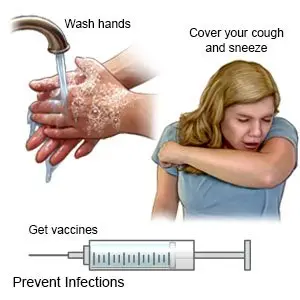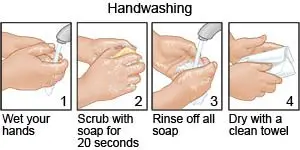What is histoplasmosis?
Histoplasmosis is a fungal infection of your lungs. It is caused by breathing in soil that is infected with fungus. The fungus is most commonly found in soil that contains bird and bat droppings.
What increases my risk for histoplasmosis?
You may be at risk for histoplasmosis if you live in an area where the fungus is common. This includes the Ohio, Mississippi, and Missouri river valleys. Your risk for histoplasmosis may also increase if you work with soil. Examples include farmers, landscapers, construction workers, and geologists. Older adults and people with a weak immune system are also at risk for histoplasmosis.
What are the signs and symptoms of histoplasmosis?
Most people do not have signs or symptoms. A mild infection may cause fever, chills, muscle aches, or fatigue. You may also have headaches, chest pain, and a dry cough. Symptoms may last 2 to 4 weeks. A severe infection may cause any of the following:
- A cough with bloody or thick yellow sputum
- Night sweats
- Shortness of breath
- A rash
- Weight loss
How is histoplasmosis diagnosed?
- Blood and urine tests will show if you have a histoplasmosis infection. Blood tests may also be done to check your blood cell levels and get information about your overall health.
- A sputum sample may be collected and tested to find the germ that is causing your illness.
How is histoplasmosis treated?
Most people do not need treatment for histoplasmosis. You may need medicine to decrease fever, pain, or swelling. You may need antifungal medicine if you have a weak immune system or lung disease. If your infection is severe you may need monitoring and treatment in the hospital.
Treatment options
The following list of medications are in some way related to or used in the treatment of this condition.
- itraconazole
- Diflucan
- Sporanox
- Tolsura
- Abelcet
View more treatment options
What are the risks of histoplasmosis?
Histoplasmosis may be more serious in older adults and anyone with lung disease such as COPD. The infection may cause serious breathing problems. It may also spread to other places in your body.
How do I prevent another histoplasmosis infection?
Stay away from places where the fungus grows. This includes caves, barns, chicken coops, and under bridges. It also includes chimneys and attics. If you must work in these areas, wear a mask over your mouth and nose. Wet the soil with water before you work with it. This will decrease your risk for breathing in soil. If you have a weak immune system, you may need to take antifungal medicine to prevent another infection.
What can I do to prevent the spread of germs?
 |
- Wash your hands often. Wash your hands several times each day. Wash after you use the bathroom, change a child's diaper, and before you prepare or eat food. Use soap and water every time. Rub your soapy hands together, lacing your fingers. Wash the front and back of your hands, and in between your fingers. Use the fingers of one hand to scrub under the fingernails of the other hand. Wash for at least 20 seconds. Rinse with warm, running water for several seconds. Then dry your hands with a clean towel or paper towel. Use hand sanitizer that contains alcohol if soap and water are not available. Do not touch your eyes, nose, or mouth without washing your hands first.

- Cover a sneeze or cough. Use a tissue that covers your mouth and nose. Throw the tissue away in a trash can right away. Use the bend of your arm if a tissue is not available. Wash your hands well with soap and water or use a hand sanitizer.
- Stay away from others while you are sick. Avoid crowds as much as possible.
- Ask about vaccines you may need. Talk to your healthcare provider about your vaccine history. He or she will tell you which vaccines you need, and when to get them.
- Get the influenza (flu) vaccine as soon as recommended each year. The flu vaccine is usually available starting in September or October. Flu viruses change, so it is important to get a flu vaccine every year.
- Get the pneumonia vaccine if recommended. This vaccine is usually recommended every 5 years. Your provider will tell you when to get this vaccine, if needed.
Call your local emergency number (911 in the US) or have someone call if:
- You have a seizure.
- You have trouble breathing.
When should I seek immediate care?
- You are confused or cannot think clearly.
- You cough up blood or thick, yellow, sputum.
- Your heart is beating faster than usual.
- You have a severe headache and a stiff neck.
When should I call my doctor?
- Your symptoms get worse or do not get better in 2 weeks.
- You have a rash.
- You have questions or concerns about your condition or care.
Care Agreement
You have the right to help plan your care. Learn about your health condition and how it may be treated. Discuss treatment options with your healthcare providers to decide what care you want to receive. You always have the right to refuse treatment. The above information is an educational aid only. It is not intended as medical advice for individual conditions or treatments. Talk to your doctor, nurse or pharmacist before following any medical regimen to see if it is safe and effective for you.© Copyright Merative 2023 Information is for End User's use only and may not be sold, redistributed or otherwise used for commercial purposes.




